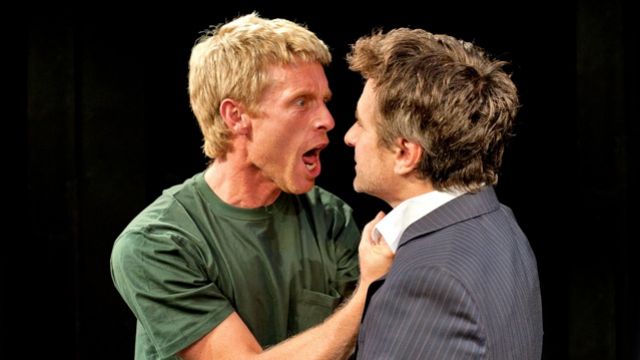Anaconda
Phil Walker was sexually abused by fellow private school students. Matty Buttiker stood by and watched. Years later, Walker is arrested for murdering one of his attackers – “It was a mercy killing. He doesn’t have to live with himself now …” – and Buttiker, now a successful barrister, offers to take his case free of charge.
Both have obviously been tormented for years by memories of the very horrible nature of the abuse. Along with the physical and emotional trauma he sustained, Walker has carried with him the betrayal of his fellow students, the hollowness of injustice (his case was almost summarily dismissed due to the power of ‘class’ and affluence) and the inability to trust. For Buttiker, who stood by and watched, and did nothing to help then or in the days that followed, the torment is guilt, hidden, not talked about, but never forgotten.

Based closely on the real case of sexual abuse at Sydney’s Trinity Grammar School in 2000, Sarah Doyle’s play is well written and carefully researched. She explores many human failings – revenge, injustice, homophobia, hero worship, class-consciousness, power, powerlessness – as well as the pervading long-term effects of trauma. The dialogue is at times tight, the messages clear and raw, albeit at times a little long in the telling.
The four characters she uses to carry these messages are strongly created and very believably depicted by each of the actors in this production.
Phil Walker is played with incredibly tight control by Simon Lyndon. He holds his Walker on a rigid rein, his inner torment covered by feigned nonchalance and tightly coiled physicality. He trusts no one, least of all a wealthy, up-and-coming, do-gooder barrister whom he once thought was his friend. Through Doyle’s words and direction, Lyndon brings out all the anguish that tears at Walker’s soul.

Damian de Montemas plays almost two characters in the part of Matty Buttiker. With his wife, Bivva, he is the suave lover and confident lawyer, making his way quickly and effectively up the social ladder. With Walker he is hesitant, anxious to please, careful not to offend. It is a hard role and one de Montemas plays with careful deliberation, using variation of pitch and pace to underline his own inner turmoil.
Leeanna Walsman, as Bivva, is Buttiker’s foil and, almost, sometimes, his alter ego. They have been together since school days. They both aim high, sharing social and economic ambitions. She knew about the ‘scandal’ at his school when it happened – yet over the years Matty has never revealed his part in the sordid affair, nor the guilt that he has borne. Walsman develops Bivva cleverly. In the beginning, she plays the upper class, working wife, anxious to be seen to be ticking all the right social boxes – albeit slightly remote, a little detached. But once this incident in Buttiker’s past emerges and becomes public knowledge, she comes out fighting – but not for Walker or Buttiker’s idealistic ‘cause’! Walsman’s immaculate timing makes the most of some very pithy lines and responses – bringing some wry relief to the tension of the play.
 As does the character of Tove Hegharty, Buttiker’s school friend, now the bartender at a gay bar. Martin Broome does not allow this character to become too camp, but successfully brings out his grace, and the lack of understanding he suffered at Buttiker’s hands so many years ago. Broome is honest and real in his depiction of this gentle character.
As does the character of Tove Hegharty, Buttiker’s school friend, now the bartender at a gay bar. Martin Broome does not allow this character to become too camp, but successfully brings out his grace, and the lack of understanding he suffered at Buttiker’s hands so many years ago. Broome is honest and real in his depiction of this gentle character.
This is a very intense play. It begins explosively – and the lighting and sound effects pick up the tense writing and action – but it would probably better reach the ‘soul’ of its audience in a more intimate theatre. In this theatre, scenes are stretched across a wide stage and sight line problems mean that some intense moments and facial expressions are obscured for those of the audience sitting on the opposite side of the auditorium. As well, some pauses, and some moments of stillness, are ‘milked’ for a little too long, losing the intended tension and, sometimes, the ‘belief’ of the audience.
These are minor problems in a play that, in Sarah Doyle’s words, explores “the difficult, the hard, the painful – the stuff that people like to push under the carpet”.
Carol Wimmer
Images (from top): Simon Lyndon and Damian de Montemas; Leeanna Walsman and Damian de Montemas; Damian de Montemas and Martin Broome, & Leeanna Walsman. Photographer: Damon Wilder
Subscribe to our E-Newsletter, buy our latest print edition or find a Performing Arts book at Book Nook.

